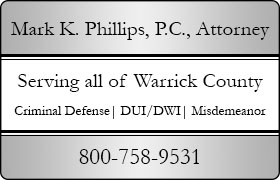Winslow Felony Lawyer, Indiana, page 4
Sponsored Law Firm
-
 x
x

Click For More Info:
-
Law Offices of Mark K. Phillips
114 South Third Street P.O. Box 427 Boonville, IN 47601» view mapDUI-DWI, Criminal Defense, Personal Injury Top Rated Indiana DUI Defense Lawyer
I offer passionate, loyal and fierce representation. I have over 20 years of experience to fight your Indiana DUI charge. I offer a free, initial consultation.
800-291-416 -
- Contact
- Free Consultation
- Visit:
- Website
- Profile
Not enough matches for Winslow Felony lawyer.
Below are all Winslow Criminal lawyers.
Samuel Adam Long
Family Law, DUI-DWI, Criminal, Consumer Protection, Personal Injury
Status: In Good Standing *Status is reviewed annually. For latest information visit here
Kurt Alan Schnepper
Estate, Divorce & Family Law, Criminal
Status: In Good Standing *Status is reviewed annually. For latest information visit here Licensed: 25 Years
Brett Michael Roy
Criminal
Status: In Good Standing *Status is reviewed annually. For latest information visit here Licensed: 23 Years
John Burley Scales
Government, Criminal
Status: In Good Standing *Status is reviewed annually. For latest information visit here Licensed: 64 Years
Jake Warrum
Criminal
Status: In Good Standing *Status is reviewed annually. For latest information visit here
FREE CONSULTATION
CONTACTKyle Frederick Biesecker
Labor Law, Employment Discrimination, Civil Rights, Civil & Human Rights, Criminal
Status: In Good Standing *Status is reviewed annually. For latest information visit here Licensed: 22 Years
Dawnya G Taylor
Adoption, Child Support, Civil Rights, Criminal
Status: In Good Standing *Status is reviewed annually. For latest information visit here Licensed: 30 Years
Karen Marie Heard
Estate, Divorce, Divorce & Family Law, Criminal
Status: In Good Standing *Status is reviewed annually. For latest information visit here
Jeremy Bruce Morris
Other, Lawsuit & Dispute, Divorce & Family Law, Business, Misdemeanor
Status: In Good Standing *Status is reviewed annually. For latest information visit here Licensed: 22 Years
 Mark K. Phillips Boonville,Indiana
Mark K. Phillips Boonville,Indiana About UsMark K. Phillips
About UsMark K. Phillips Contact UsCall or Email Now
Contact UsCall or Email Now